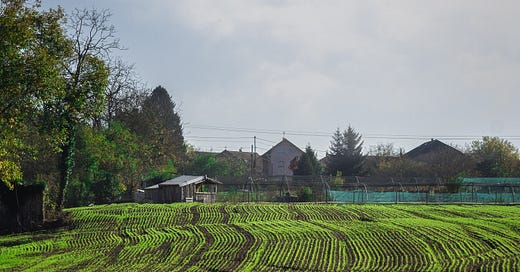Twenty Years From Now
Monday night my husband and I went to an Andrew Peterson concert at a local college campus. Andrew took the stage with an acoustic guitar and plenty of stories, starting the show off with a Rich Mullins tune entitled “Hello, Old Friends:”
"Hello old friends
There's really nothing new to say
But the old old story bears repeating
And the plain old truth grows dearer every day”
This song hit me in kind of a weird place because I’d just had a dream about Rich Mullins a few nights earlier. I had dreamed that I was sitting in a circle with Rich and a few other people, and we were going around the circle introducing ourselves. “I’m from Illinois,” I said, “ just a few miles away from where you died.”
There was a line from “Hello, Old Friends” that particularly struck me that night, when Andrew sang it:
“Did we sow the seeds we’re reaping
Now that the harvest calls us here?”
The implication is that the life we are living today is the natural result of choices made–or “sown”-- long ago. This is basic cause and effect. And yet, life is so complex, it is often hard to keep this principle in mind.
Sometimes the idea of sowing and reaping can be a bit depressing. The seeds I have sown have been random and scattered. I have lived much of my life in an emotive, reactive mode, rather than in an intentional one.
People often ask, “where do you see yourself in five years from now?” But five years, I think, is too short-range to get at the big, important questions. Think of all the unforeseen things that can happen to derail a five-year plan: economic downturn, job loss, death, sickness, accidents–or, on the more positive side– marriage, the birth of children, unforeseen opportunities.
I’ve tossed out the five-year question and am beginning to ask myself this one: What kind of harvest do I hope to reap in twenty years?
I can’t unplant the weeds I planted long ago, nor can I retroactively plant the good seed I failed to plant. But I can plant good seed now, in the hopes of a better harvest in the future.
In twenty years, I want to be able to look back and say that I was faithful in my responsibilities and commitments and that I pursued things that were worthwhile.
Though I know little about him as a person and have just a basic sense of his career trajectory, from what I can observe, Andrew Peterson’s career seems to exemplify this. He is a person who has worked consistently and diligently at his craft, despite changing trends and not quite fitting into the Christian musician mold, while (if his songs are any indication) prioritizing the most important things. The result of this is a solid career that he has built over the years and songs that are meaningful to people across generations.
In twenty years, I want to look back and say that I have sown love and kindness into people’s lives, as I had the opportunity.
I want to invest in people without prejudice, whether young, old, rich, poor, good, or bad. Any person life puts in front of me–for whatever reason–is an eligible recipient of some concrete act of kindness on my part.
In the past I have stumbled over this idea, thinking that people don’t need or value what I have to offer. But I am coming to believe that even the richest person in the world can appreciate a heartfelt gift, however small, and that even the most popular person in the world may value a sincere compliment (as opposed to empty flattery).
Of course, we will never know the result of our sowing in advance. We may sow diligently into a worthwhile career…and fail. We may sow seeds of love and kindness into the lives of people who couldn’t care less.
And there are people who don’t work hard at all, and life seems to hand them everything.
This is part of the risk of living.
The parable of the talents addresses this uncertainty: the person who buried his talent because of what he considered to be the caprice of his master was called a “wicked and lazy servant.” The message is that life–with all its gifts and opportunities–has been entrusted to us, and we are supposed to steward it to the best of our ability, despite the outcome.
The reality is that not all of us have twenty years of life left. Rich Mullins, for instance, died at 42.
But even if I die tomorrow, I can sow a good seed today.
I can, perhaps, give someone a shred of faith or hope that may sustain him or her in a future world, one from which I may have departed.



